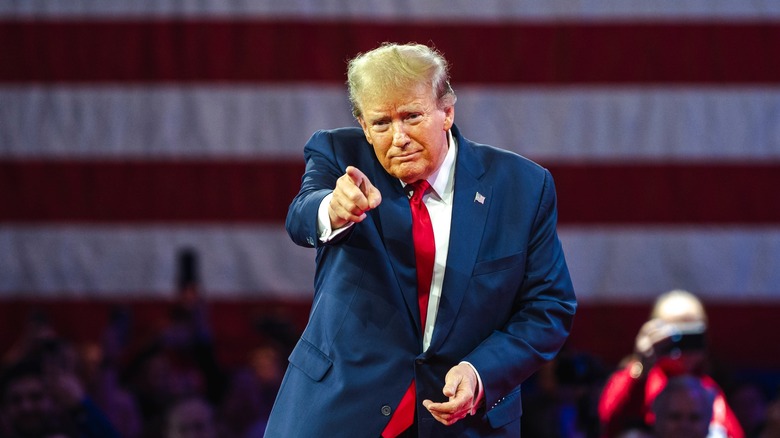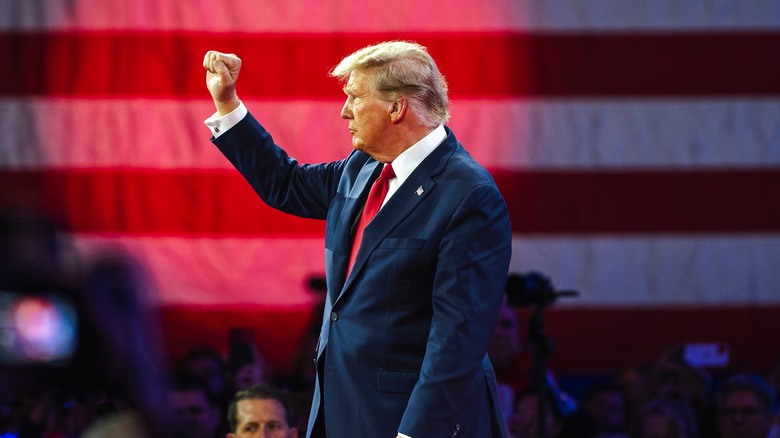Ex Trump Advisor Makes Scathing Claim About Former President's Ego (& No One's Surprised)
There's no question that Donald Trump's signature ego is the stuff of legends, but a book written by his former national security advisor, General H.R. McMaster, has shed even more light on just how deep Trump's vanity runs. While the details that emerge in the book, "At War with Ourselves: My Tour of Duty in the Trump White House" paint Trump in a very unflattering light, we doubt anyone is surprised by how far the former president will go in service of his self-image. After all, Trump has even let his son Barron Trump's staggering height bruise his ego and frequently lashes out at those who disagree with him on social media. For example, McMaster's own departure from the Trump White House team was precipitated by a disparaging tweet:
General McMaster forgot to say that the results of the 2016 election were not impacted or changed by the Russians and that the only Collusion was between Russia and Crooked H, the DNC and the Dems. Remember the Dirty Dossier, Uranium, Speeches, Emails and the Podesta Company!
— Donald J. Trump (@realDonaldTrump) February 18, 2018
According to a CNN analysis, McMaster's book shares multiple examples of Trump making unwise, self-motivated presidential decisions, such as taking Russian President Vladimir Putin's offers of friendship at face value. McMaster also credits Trump's outlandish self-aggrandizement for fueling the events of January 6, 2021: "[Trump's] ego and love of self... drove him to abandon his oath to 'support and defend the Constitution,' a president's highest obligation."
As Jonathan H. Westover, PhD. of Forbes explains: "Ego and pride have caused the downfall of many great civilizations, organizations and leaders throughout history." Based on Westover's analysis of the relationship between ego and leadership, it appears Trump may face an uphill battle in righting the ego-driven wrongs of his first presidential term — assuming he even sees incidents like those McMaster describes as "wrong" in the first place.
Donald Trump's ego clouds his judgment
Of course, letting ego get in the way of being an effective leader isn't unique to Trump, and McMaster's anecdotes reflect very common patterns in leaders who let their self-image cloud their judgment. According to Westover: "With an inflated ego comes a propensity to prioritize one's own status, power and legacy above all else. Short-term self-focused choices undercut long-term organizational success and vision." This is in line with many of McMaster's descriptions of the Trump White House, such as his assertion that many staff meetings were "exercises in competitive sycophancy" rather than productive work sessions.
In 2014, The New York Times delved into Trump's motivations by analyzing recordings of interviews between the former president and author Michael D'Antonio. As the article explains: "The recordings reveal a man who is fixated on his own celebrity, anxious about losing his status and contemptuous of those who fall from grace." Trump's dislike of people who embarrass themselves, or are otherwise not up to his standards, could be a reflection of some of his own insecurities. For example, Trump has accidentally confirmed being self-conscious about his weight and several other personal shortcomings over the years, but these admissions are often revealed in thinly veiled criticisms of others.
Perhaps the most telling look into Trump's worldview is how he responded to a question about the meaning of life. According to the New York Times, Trump said: "No, I don't want to think about it. I don't like to analyze myself because I might not like what I see." Given this statement, Trump's desire to surround himself with the type of sycophants McMaster describes may simply be a way to avoid facing some uncomfortable self-truths.

